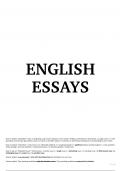Exam (elaborations)
Consolidation of 107 corrected English essays on various topics
- Course
- Institution
107 English essays on all the English subjects in the preparatory class curriculum, useful in the context of reviewing and training in business and engineering degree competitions.
[Show more]



